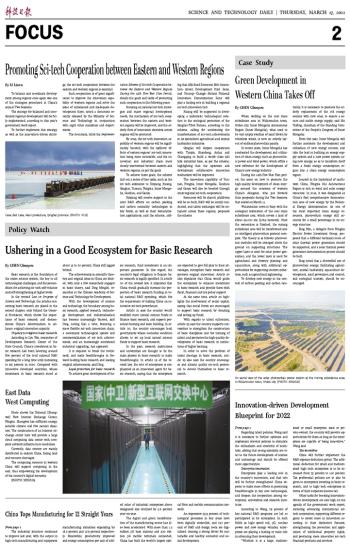
Basic research is the foundation of the entire science system, the key to all technological challenges, and the precondition for achieving sci-tech self-reliance and self-strengthening at higher levels.
In the revised Law on Progress of Science and Technology, the articles concerning basic research are placed in the second chapter, only behind the General Provisions, which shows the importance of basic research and demonstrates China's determination to enhance original innovation capacity.
Urgency to reinforce basic research
According to Lyu Wei, researcher of Development Research Center of the State Council, China's investment in basic research had been hovering around five percent of the total national R&D spending for a long time until increasing to six percent in 2020. Compared with innovative developed countries, whose investment in basic research stood at about 15 to 20 percent, China still lagged behind.
The achievements in scientific theories and original ideas in China are limited, with only a few researchers engaged in basic theory, said Ding Minglei, researcher at the Chinese Academy of Science and Technology for Development.
With the development of science and technology, the boundary among basic research, applied research, technology development and industrialization has become increasingly blurred, said Ding, noting that a time, featuring a more flexible sci-tech innovation chain, a convenient technological update and commercialization of sci-tech achievements, and an increasingly accelerated industrial upgrading, has appeared.
It is required to break the bottleneck, and make breakthroughs in forward-looking basic research and leading original achievements, said Ding.
Legal protection for basic research
To achieve great development of basic research, fund investment is an important guarantee. In this regard, the country's legal obligation to finance basic research is legally specified. In article 20 of the revised law, it stipulates that China would gradually increase the proportion of basic research funding in total national R&D spending, which fits the requirement of making China an innovative sci-tech powerhouse.
Article 21 says the country would establish more natural science funds to finance basic research, and support personnel training and team building. In article 20, the country encourages local governments whose economic condition allows, to set up local natural science funds to support basic research.
In the past, research institutions and universities are thought to be the main players in basic research to make breakthroughs. In article 19 of the revised law, the role of enterprises is emphasized as an innovation agent for basic research, saying that the enterprises are expected to give full play to their advantages, strengthen basic research and promote original innovation. Article 20 also stipulates that China would guide the enterprises to enhance investment in basic research and provide them with fiscal, financial and tax policy support.
At the same time, article 20 highlights the involvement of social capital, saying that social forces are encouraged to support basic research by donating and setting up funds.
With regards to talent cultivation, article 25 says the country supports universities to strengthen the construction of basic disciplines and the training of talent, and promotes the high-quality development of basic research in institutions of higher learning.
In order to solve the problem of talent shortage in basic research, article 23 also says the country encourages and attracts quality sci-tech personnel to devote themselves to basic research.


 Next
Next




